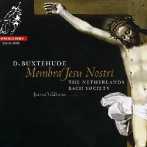Amazingly, both Channel Classics and Harmonia Mundi chose to record and release Buxtehude’s rarely-heard cantata cycle Membra Jesu nostri at virtually the same time. Your choice should not be determined by performance standards or engineering expertise, for both recordings are outstanding in those respects; instead, you should consider more subtle differences or such things as particularities of individual voices or of instrumental configuration. (For a description of the Harmonia Mundi/Cantus Cölln disc and of the work itself, see Reviews archive.) For instance, this performance by The Netherlands Bach Society features felicitous little touches of instrumental ornamentation not present on the HM disc, especially from theorbo player Mike Fentross. In fact, the inclusion of theorbo is an important difference between the two recordings–it really adds welcome color, and its little “fills” keep things moving with a purposeful flow. Also, conductor Jos van Veldhoven’s performance offers slightly more dramatic emphasis in phrasing and dynamics, which generates a bit more excitement in a work that can seem predictable and repetitive from section to section. This more theatrical approach is especially evident–and effective–in the opening to the third cantata, Ad manus, with its striking dissonances and oft-shifting dynamics and phrase-lengths.
The vocal ensemble is comparable in balance to the Cantus Cölln singers, but I always find soprano Johannette Zomer’s vocal quality to be overly piercing, and it’s a factor here (although less than in some previous outings), whether she sings solo or with other voices. However, her rendition of the lovely Klagelied (Lamentation), part of the filler material that closes the disc, is (but for some upper register notes) one of her finer performances in the past few years. You should also know that you really need the information from both sets of liner notes to piece together a fully adequate picture of the Membra Jesu nostri’s origin and significance. I’m still surprised that both recordings appeared at once, but I’m not sorry. Both are excellent, and you can’t go wrong whichever you choose. Channel Classics’ sound is typically demonstration quality. [4/19/2006]
































